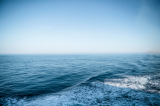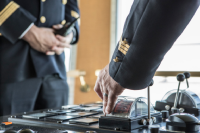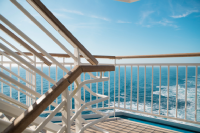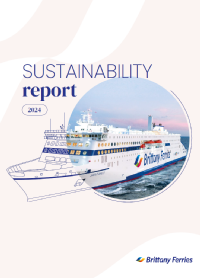
Commitment to Environmental Responsibility
Because the protection of the environment is a core value in its approach to sustainability, the Company is making a firm commitment to an environmentally-friendly future.
Green Marine Europe – Environmental Excellence Label
Brittany Ferries is proud to be among the first companies to obtain the “Green Marine” eco label, which promotes best practices in maritime sustainability. The company was first audited in August 2020 and received its initial accreditation certificate during a ceremony held in Paris on 8 October 2020. This label serves as a reliable indicator assessing environmental performance across seven criteria, including greenhouse gas emissions and underwater noise. It is also subject to independent verification, and progress can be tracked year after year, enabling the company to reach higher standards more rapidly.
A New Generation of Sustainable Maritime Transport
Saint-Malo was named “Ferry RoPax of the Year” at the Ferry Shipping Summit held in Malmö, Sweden, on Thursday, 13 November 2025. This distinction reflects the positive momentum driving the Company forward, It recognising its commitment to a new generation of sustainable maritime transport, combining performance, responsibility, and environmental concern.
OUR ACTIONS
Signing of the “Chart SAILS”
The Chart SAILS - a charter of best practices for maritime transport aimed at protecting the marine environment and coastal areas - has been ratified by 12 shipping companies, including Brittany Ferries. The Breton company is strengthening its environmental by working with NGOs, while continuing to advance research into new fuels and innovative propulsion technologies.
*Sustainable Actions for Innovative and Low Impact Shipping.
“Charte bleue” of Armateurs de France
All French maritime transport and service companies that are members of Armateurs de France (the French chamber of shipping), including Brittany Ferries, adhere to the commitments of the Blue Charter, regardless of the flag under which their vessels are registered. These commitments aim to promote the development of a maritime industry collectively engaged in a successful energy transition, while pursuing an overarching objective of sustainable development that encompasses significant social responsibility challenges.
Everyday R&D
Brittany Ferries is a partner of CEA Tech, a world renowned research and development institute. In addition to a feasibility study on integrating photovoltaic panels and batteries aboard an existing vessel to power selected onboard systems, a second study is underway to establish a long range, high bandwidth Wi Fi link on the Caen–Portsmouth route. The objective is to enhance onboard services and enable real time data exchange.
As part of a call for projects launched by ADEME (the French Environment and Energy Management Agency), Brittany Ferries is also contributing to a scientific and technical programme aimed at characterising fine particle emissions from ships (CAPNAV – led by Estaca).
Specialized Coatings
Brittany Ferries uses the latest silicone based hull coatings for the underwater areas of its vessels. These low toxicity coatings improve hydrodynamic performance and help reduce CO₂ emissions. The deployment of this technology in recent years has enabled the Company to lower its fuel consumption and, consequently, decrease its atmospheric emissions.
Energy Savings
Since the end of 2018, an energy saving device has been installed on the hub of each propeller on the Pont-Aven. This system, which takes the form of a small auxiliary propeller mounted on the propeller cap, helps minimise flow losses at the outflow of the propeller, The installation of two Wärtsilä EnergoProfin units will generate fuel savings of around 2%, thereby reducing atmospheric emissions by the same margin. The supply and installation costs allow for a projected return on investment in under one year.
Optimised Routes
On Brittany Ferries’ sea routes, current variations are significant. Vessels operating long haul crossings are equipped with routing software that incorporates tidal data, weather conditions, and operational parameters. The system provides navigational recommendations designed to reduce fuel consumption and atmospheric emissions.
Freshwater Self Sufficiency
Because freshwater is a scarce and valuable resource, most vessels in the fleet are equipped with systems that produce freshwater on board by heating and desalinating seawater. These installations help reduce the overall environmental footprint.
Wastewater Treatment
All Brittany Ferries vessels delivered over the past twenty years are fitted with wastewater treatment systems. Any water contaminated by chemicals such as hydrocarbons is processed on shore by certified specialist companies.
Plastic Reduction
Brittany Ferries has implemented measures to reduce the use of single use plastics in dining areas and cabins across its entire fleet.
Zero waste discharge at sea and recycling
In addition to efforts to reduce overall waste volumes and those of non biodegradable materials, all waste generated on board is offloaded and processed through specialised recycling and recovery channels. This includes everything from batteries and cooking oil to office paper and operational waste such as paint cans, contaminated rags, containers, metals, and wood.
To build on these efforts, a study co funded by ADEME was carried out in 2019/2020 to identify actions that would optimise the management of waste generated both on board and on shore, and to reduce it at the source.
Local Sourcing for Ship Provisioning
Brittany Ferries prioritises local producers and farmers to ensure fresh, seasonal products while reducing its carbon footprint.
Protection of Marine Environments
In 2025, as part of the National Action Plan for the Balearic Shearwater, Brittany Ferries renewed its commitment to marine biodiversity by collaborating with the Groupe Ornithologique Normand (GONm) for the second consecutive year. The objective is to observe and analyse the movements of the Balearic Shearwater -a threatened species -during the St Malo to Portsmouth crossings.
15 crossings were carried out between June and October 2025 aboard Saint-Malo, following a rigorous protocol established by two GONm scientists (daytime observations, shearwater counts, and monitoring of other marine species).
The results of this campaign show that more than 6,000 Balearic Shearwaters were recorded, with a peak of 3,306 individuals in early August 2025.
This partnership reflects Brittany Ferries’ determination to take meaningful action to protect the inhabitants of the seas it sails.
Passenger Awareness with ORCA
On its sea routes crossing the Bay of Biscay, Brittany Ferries has been organising presentations and wildlife observation sessions for more than 20 years in collaboration with the Organisation Cetacea (ORCA). This association is dedicated to the long term protection of whales, dolphins, and porpoises (cetaceans) and their habitats in European and UK waters. Volunteers live and work on board for four week periods, following the rhythm of sailings to Spain from spring through to autumn. In addition to raising passenger awareness, they study and monitor cetaceans to estimate population sizes, record their movements, and better understand their behaviour to support their protection.
In 2025, 60 crew members were trained in cetacean observation and in analysing their presence zones.
SAHFOS
Brittany Ferries works closely with the Sir Alister Hardy Foundation for Ocean Science (SAHFOS), an non-profit organisation based in Plymouth, United Kingdom. SAHFOS is best known for operating the Continuous Plankton Recorder (CPR) Survey, one of the world’s oldest and most extensive marine ecological monitoring programmes. Several of the Company’s vessels are equipped with CPR systems, thereby contributing to ongoing plankton research.
Our People
Brittany Ferries - the story of many hundreds of passionate staff members enjoying fulfilling careers


